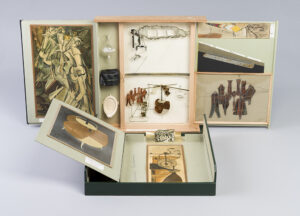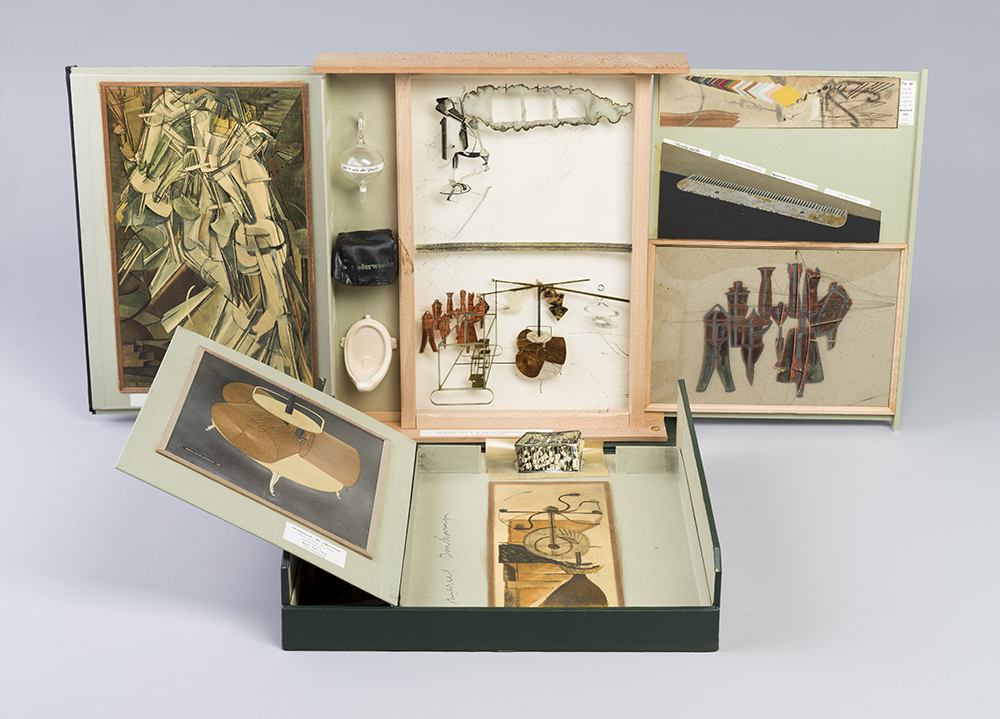John Ashbery called me after he died
So you can imagine my excitement
When in his droll hyper-nasalated
Timbre quite undiminished by death
He chatted on about the bowls of
Pitted cherries provided as snack-food
In the upper worlds and of afternoons
Climbing trees with Edna Millay to read
Comic books with her in the branches.
Then his voice dropped two octaves
And he spoke solemnly of Jack Benny:
‘You can say funny things or say things
Funny but silence was the punchline
For Jack Benny.’ And he was gone.
A Minor History of Potato Chips
By TINA CANE
Ray Liotta was listening to tapes of Henry Hill talking through a mouth
full of potato chips to the FBI around the same time I high and hunched
over a bowl of Lucky Charms was listening to my father lecture me on sex
The Story of a Box

PARTIAL VIEW OF RESTORED HARRISON BOÎTE. MARCEL DUCHAMP (AMERICAN 1887-1968), BOX IN A VALISE (BOÎTE-EN-VALISE) FROM OR BY MARCEL DUCHAMP OR RROSE SÉLAVY, 1963 (SERIES E ). CINCINNATI ART MUSEUM: GIFT OF ANNE W. HARRISON AND FAMILY IN MEMORY OF AGNES SATTLER HARRISON AND ALEXINA “TEENY” SATTLER DUCHAMP, 2016.305 © ASSOCIATION MARCEL DUCHAMP / ARTISTS RIGHTS SOCIETY (ARS), NY / ADAGP, PARIS 2023. IMAGE COURTESY OF CINCINNATI ART MUSEUM, PHOTOGRAPHY BY ROB DESLONGCHAMPS
“Everything important that I have done can be put into a little suitcase.”
—Marcel Duchamp, Life magazine, 1952
For many years I hardly told anyone that my grandmother’s sister Teeny was married to Marcel Duchamp, and before that to Pierre Matisse, the art dealer son of Henri. Friends I’ve known all my life have stopped me in disbelief when these facts have come up in passing—a disbelief arising not from the facts themselves but from my never having shared them. The first time I ever mentioned the connection to anyone outside the family, I was in college, sitting in the Hungarian Pastry Shop on Amsterdam Avenue with my professor, the poet David Shapiro. “Wait,” he said, “Teeny Duchamp is your great aunt?!” I was surprised he knew exactly who she was.
Body
By SULAIMAN AL-SHATTI
Translated from the Arabic by MAIA TABET with LAURA ALBAST
Whenever she spoke, my mother habitually turned down her upper lip and clenched her teeth as if to control the flow of her words—filtering them, if you will. Her teeth were white and strong; they were free of blemishes, except for the three that had been chipped in an old accident. She leaned in toward whomever she was conversing with, an apologetic smile on her face, which our neighbor’s daughter described as radiating kindness. A colleague who was once delivering an urgent message to me couldn’t help but remark that even from a distance her beauty was striking. He must not have seen her moving about with the distorted gait that caused one side of her rear to rise as the other descended. Although it had become less conspicuous with age, her limp harkened to another old story, but whenever anyone inquired about it, my mother just smiled enigmatically. Some of the questions were innocent enough, but others seemed veiled––I couldn’t fathom their subtext, nor could I recall anything from the actual events that might help me discern the questioner’s motive. All I know is that I had grown used to the way her limp caused gasps of astonishment, making mouths salivate with unspoken questions and eyes gleam with curiosity.
Night of the Mermaid
By BASSAM ALMUSALLAM
Translated by MAIA TABET
Her face emerged from the sea. And then her glistening body.
The rope writhed in his clenched fists like a fish fighting him, but then it subsided. It gradually slackened and fell still between his hands.
After the Last Calorie of the Apocalypse / Prayer for the Clinically Obese
On the last day, let there be a fat inhalation
of delight between the lap of our sunrise.
As the tongue separates the doubt from the cream,
let pleasure sift through the metal strainer of time. Only
Berber Perfumes
By HOODA SHAWA QADDUMI
Translated from the Arabic by NARIMAN YOUSSEF
They say that, sometime at the end of the nineteenth century, a woman came on a wooden ship from Najd, married a wealthy man from the island, and, when she didn’t conceive, had a maqam built on the ruins of a pagan temple near the cliffs of the shore. Having had a dream where a man holding a staff spoke to her, the woman then named the maqam after the mystic Al-Khidr.
Contemporary Art Platform: Selections from Kuwait
Courtesy of the CONTEMPORARY ART PLATFORM (CAP)

GHADAH ALKANDARI, UNTIL (2017),
ACRYLIC ON CANVAS (180 X 240 CM)
Walden
Whatever Walden is to me—we swam there two Julys—
I hope to skirt that never-ending trope,
Drowning like a pilgrim in that pond.
We pushed past mothers and their kids,
Cedared summers in Wellfleet cottages,
Past foreign languages that hummed across
The narrow circle of that one dirt path
Spa Days
I drive through the yellow ribcage of maples
arching the road, past the butch woman I want
to be, raking leaves in her front yard, hair
slicked back at the sides. Yesterday, searching
the internet for winter tights, I found crotchless ones,
a model’s diffident fingertips barely obscuring
the hairless glow of her pussy, and remembered
the years I spent lying on a table in a quiet room,
piped sound of harps descending from the ceiling,
while some other woman carefully made my body
as smooth and unthreatening as a child’s.










